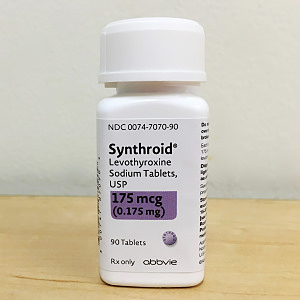
Doctors have long known that people who make too much thyroid hormone are at risk for weakened bones. This is also a problem for those who take synthetic levothyroxine to supplement their underactive thyroid glands. However, experts thought that keeping thyroid hormone levels within normal limits would not trigger a loss in bone density. They had faith that only when the dose was excessive was thyroid treatment linked to osteoporosis.
Is Thyroid Treatment Linked to Osteoporosis at Normal Doses?
A study presented at the annual meeting of the Radiological Society of North America indicates that older people taking levothyroxine have less dense bones. That is true even if their thyroid hormone levels are within normal bounds.
To determine this, the scientists analyzed data from the Baltimore Longitudinal Study of Aging. This study has been following older people for many years. The analysis included people over 65 who had undergone at least two DEXA measurements of bone density. Eighty-one of these individuals were taking levothyroxine. Based on normal TSH measurements, the investigators concluded that their doses of levothyroxine were correct. In doctor parlance, these people are “euthyroid,” in the sweet spot indicating good thyroid hormone levels. In addition, 364 volunteers were not taking levothyroxine.
People on levothyroxine had lost more bone density and total bone mass than the others, even though their thyroid hormone levels were normal. This suggests that thyroid treatment could eventually result in osteoporosis. The authors recommend regular bone density tests for people taking thyroid medication.

Worries about the possibility of thyroid treatment linked to osteoporosis are not new. We received this question many years ago.
Long-Term Treatment with Thyroid Hormone Followed by Osteoporosis:
Q. I have been on thyroid hormone replacement for more than 20 years. Now I have been diagnosed with osteoporosis.
My doctor prescribed Fosamax and then Actonel. I have heard that such drugs can cause jaw bone deterioration. This happened to a friend of mine and I am quite concerned.
What other options are available for treating osteoporosis?
A. Too much thyroid hormone can weaken bones. Long-term use of levothyroxine, even at appropriate doses, may also decrease bone density. You can learn more about treating hypothyroidism in our eGuide to Thyroid Hormones.
Managing Osteoporosis:
Although bisphosphonate medications like Fosamax and Actonel are popular treatments for osteoporosis, they have been linked to osteonecrosis of the jaw. Jaw bone death does not seem to be common, but it is a frightening side effect and extremely difficult to treat. It appears to be triggered by dental extractions or other invasive procedures. People with known dental problems should have them taken care of before starting such medication.
There are a number of other medicines that can strengthen the bones. Ask your doctor to discuss Menostar, Evista, Miacalcin, Forteo, Tymlos and Evenity as possible alternatives. Each of these works differently from Fosamax and all are used to treat osteoporosis.
People with low bone density should be sure to get adequate vitamin D along with calcium and magnesium. That would be at least 1,000 IU vitamin D a day.

